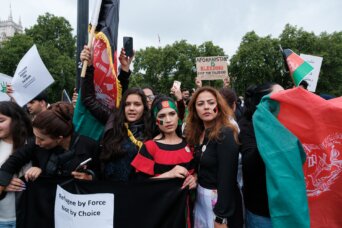- About
- Topics
- Picks
- Audio
- Story
- In-Depth
- Opinion
- News
- Donate
- Signup for our newsletterOur Editors' Best Picks.Send
Read, Debate: Engage.
| topic: | Good Governance |
|---|---|
| located: | Afghanistan |
| editor: | Shadi Khan Saif |
Afghanistan's de facto ruling government, the Islamic Emirate by the Taliban, is seemingly trying its best to earn international recognition by appeasing the US and other global powers - but what about earning internal legitimacy by satiating the will of the people?
For almost a year after capturing power in Kabul, the group has remained in a kind of post-war victorious arrogance with little regard for the basic services, needs and will of the people, particularly the minority groups in the richly diverse country. It has miserably failed in ensuring peace and order as well - the two areas the Taliban boasted a lot about as their strong points.
Series of deadly blasts in major urban centres and inside sacred places of worship are rampant. And the Taliban seems more concerned about covering up the media coverage of these atrocities than about putting in place vigilant intelligence, surveillance and preventive mechanisms.
Upon concluding his trip to the war-ravaged country, the UN Special Rapporteur on the situation of human rights in Afghanistan, Richard Bennett, acknowledged that the Taliban extended its invitation to access the entire territory and to visit sensitive locations such as schools, hospitals and prisons, a crucial commitment to ensuring that transparent monitoring can be undertaken. This too signifies the group's desire to earn international reputation and recognition.
Bennett also pointed out that armed hostilities in many parts of the country had ceased and, consequently, there was a reduction in conflict-related casualties since the Taliban took over power. This signifies the opportunities available to establish an inclusive, well-represented and internally legitimised government to overcome the grim humanitarian crisis that Afghanistan is facing. Inclusion of the local people at every level is pivotal if the Taliban wishes to transform itself into a governing body to serve the country and its people.
There is an evident need to prioritise the development of rural areas in the country that were, for a long time, used as battlegrounds and were therefore deprived of the services developed in other parts of the country. These include the rural areas of the mountainous land that either remained under the control of the Taliban, or were contested by them, resulting in deaths, destruction and migration
And then there are the cities, towns and suburban quarters that were hardly under the influence of the Taliban before last August. The Taliban, as a single party or group, must not treat or deal with these areas and its people as subjects of conquered territories and should instead pave the way for a national dialogue on the shared future of the land.
Without any further ado, the de facto rulers and the international community must acknowledge and pursue the internal legitimacy of the country with participation of all segments of its society as equally, if not more, important than international recognition, in order to bring peace and order to Afghanistan.
Photo by Ehimetalor Akhere Unuabona

